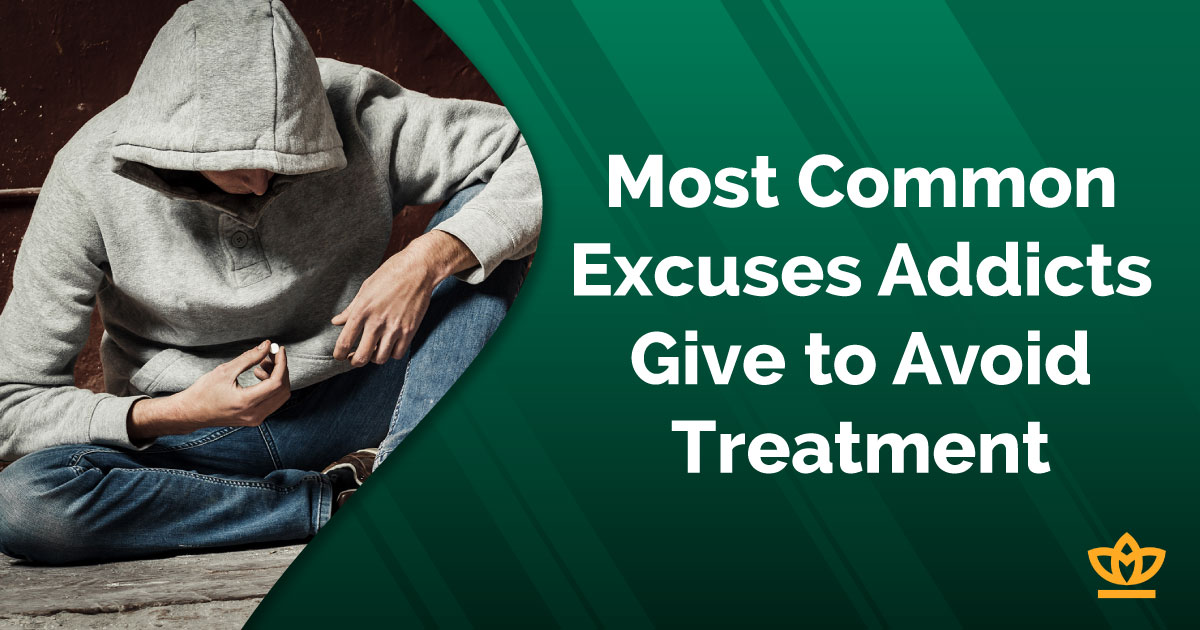The 6 Most Common Excuses Addicts Give to Avoid Treatment

In the late 20th century, addiction was recognised as an illness, and it has been shown that it can be treated with proper medical care and attention. Yet there is a stigma associated with addiction that makes it look like an act of a criminal. Throughout history, research on addiction has shown that the fight against addiction is not just about individual recovery but also social recovery.
As humans, it’s our fundamental behaviour to find bonds that we can cherish. We need to have things in our life that give our life meaning and make us feel alive. When there is a void, people try to fill it with anything possible, and that’s where addiction comes in. The most common types of addictions that we see in society are phone addiction, pornography addiction, drug addiction, video games addiction, gambling addiction, and alcohol addiction.
Addiction is one of the widely misunderstood and mistreated problems in the world. While most of the world use punishments as a treatment for addiction, research shows that it worsens the case.
Professor Alexander well explains this phenomenon in one of his experiments with rats. In his experiment, he put rats in two separate cages. In one cage, rats were isolated and left alone. In another, rats had friends to play with and a lot of food to eat. He called this experiment ‘the rat park experiment’.
In both cages, rats were given the option to choose between normal water and drugged water. Surprisingly, rats in the rat park chose normal water and hardly drank the drugged water. On the other side, the isolated rats chose to drink drugged water and got addicted to it. This experiment gives us a perfect picture of how addiction happens.
Even after so many years of research and development, addiction problems are not mostly handled the way they should be. People start distancing themselves from addicts. To avoid this, it is important to understand the behaviour of addicts so that they can be treated before it’s too late. Here is a list of common excuses addicts make to avoid treatment.
1. I Am Not That Much Addicted
This is a common excuse that addicts give. It’s because getting addicted is a gradual process and it’s hard for a person to notice the change in their behaviour, while others can see the difference.
We need to understand that there is no fixed amount of addictive substances you consume to call it an addiction. In the case of alcohol, some regular drinkers drink daily, and then there are binge drinkers who drink once in a while. So, it’s better to consider it as early as possible and consult for treatment.
2. I Am Under Control
As there is a stigma around addiction, people who face problems often try to convince others that they can get out of it on their own. It may be true for some cases, but without anyone’s help, it’s not easy. Addicts often live in denial and can not comprehend the idea of them being vulnerable.
It is a mixture of ego and fear that makes the person keep their guards up all the time, and living in denial is their defence mechanism. Warm conversation and empathy can help convince them for treatment.
3. I Don’t Need a Treatment
When the patient does not know the way addiction is treated, it is obvious for them to doubt the process. There are many cases where patients never trusted the process, and hence, could not fight their addiction. It is also a type of defence mechanism that they use. By showing that the treatment is not working, they try to prove that it’s not the way for them.
It is important to talk to the patient and help them understand how the treatment will help them. Assure them of their well being and show your support over small steps that they take towards de-addiction.
4. I Have Self-Control
Everyone thinks that they can change themselves on their own, but in the case of any physical changes in the body, one can’t deal with it on their own. Self-control is important when it comes to de-addiction, but it’s not the only thing that is required.
5. I Have To Do This To Be Socially Acceptable
One of the major reasons behind not accepting addiction problems is the fear of social rejection. As mentioned before, the stigma associated with addiction makes people mistreat addicts. While addicts suffer through illness, if the society also treats them differently, it is obvious for them to think more about social acceptance than finding help.
6. I Am Better Than Many Others
Addicts may often try to prove that their problem is not as serious as others. Addiction also makes people delusional. Mood swings and bipolar behaviour are some of the common symptoms. Hence, it is important to consult with an expert and ask for guidance.
Talking with people suffering through addiction can be a tricky thing. If you start behaving the way they behave with you, then situations may get worsened. It’s always better to help them open up and share their feelings.
Bottom Line
Addiction is not a stand-alone problem. It often comes with some other mental problems or trauma, and it also creates other psychological problems. One needs to know the concept of ‘addiction’. It should be conveyed that asking help is not an act of coward but the act of bravery.
As Johann Eduard Hari said in one of his Ted talks, “The opposite of addiction isn’t sobriety. It’s a connection.”












